ডব্লিউএসআইএস-এনইআইআর
Organization: Bangladesh Telecommunication Regulatory Commission (BTRC)
Country: Bangladesh
Project Title: National Equipment Identity Register
Project Duration: 18 February 2020 to 1 July 2021
Executive Summary
National Equipment Identity Register (NEIR) has been deployed by Bangladesh Telecommunications Regulatory Commission (BTRC) in order to ensure the accountability of every mobile handsets used within the territory of Bangladesh along with its user authentication. This systems also helps prevent criminal activities using mobile handsets and to provide better citizen services using analytical information generated from the system.
Project Description
Mobile phone usage has spread throughout society over the last decade. While there have been well documented positive impacts, this increased use has also led to an increase in criminal activity over mobile phones, such as using of stolen or counterfeited mobile devices, extortion, intimidation and harassment, causing public alarm and tarnishing the country's image. In order to address these issues and to apply regulatory tools while necessary for the betterment of the citizens the National Equipment Identification Register (NEIR) was deployed in Bangladesh last year.
This system is the central platform to control the access of a mobile device into the mobile network through necessary device verification. The system maintains International Mobile Equipment Identity (IMEI), Mobile Station Integrated Services Digital Network (MSISDN), User’s National ID (NID) etc. of all mobile devices connected with all the Cellular Mobile Phone Operators’ (CMPO) EIRs and other related stakeholders. Besides, maintaining proper access control of all mobile devices in Bangladesh, NEIR also monitors CMPO EIRs as well.
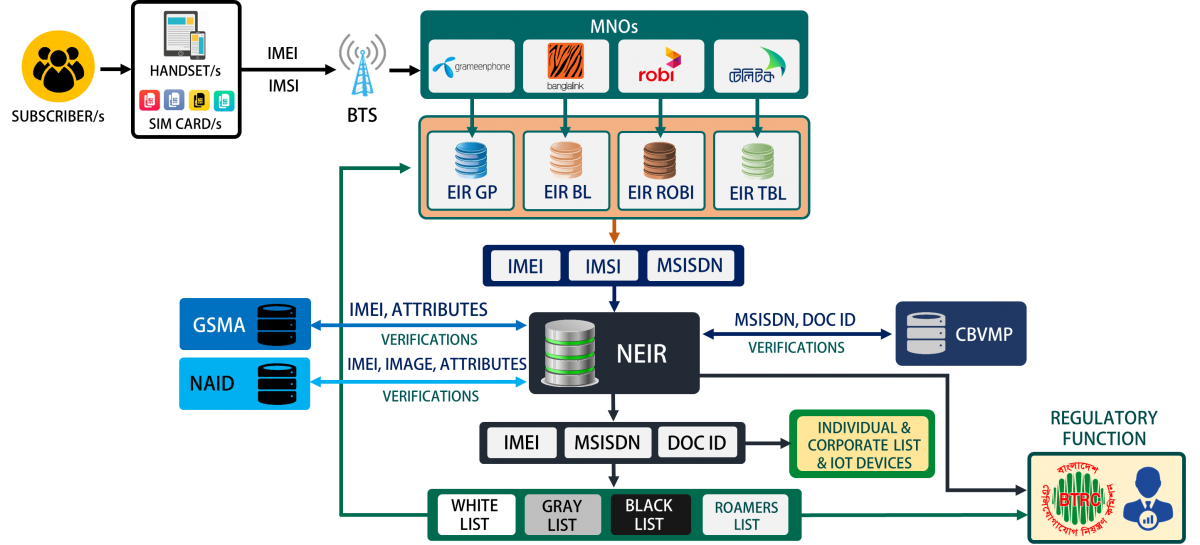
Figure: Solution diagram of NEIR system
Goal
Setting up a centralized platform to control the access of a mobile device into the Cellular Mobile Phone Operators’ network through necessary device verification and to ensure safe use of digital mobile devices to the citizens.
Objectives
The primary objective of implementing NEIR is to register all mobile handsets with necessary information about their users, so that the authorities will be informed about each and every handset with its user credentials. It is also the responsibility of the Government to ensure genuine products for its citizens and prohibit smuggled mobile phone sets from entering the market. The Government also wanted to setup a system which could investigate illegal activities using cloned/illegal handsets or stolen handsets, and categorize users etc. In short, the objective of this system is to prohibit, restrict otherwise control the use of telephony technology in criminal activities, the theft of mobile devices, the use of unregistered mobile devices and monitoring of mobile devices in Bangladesh.
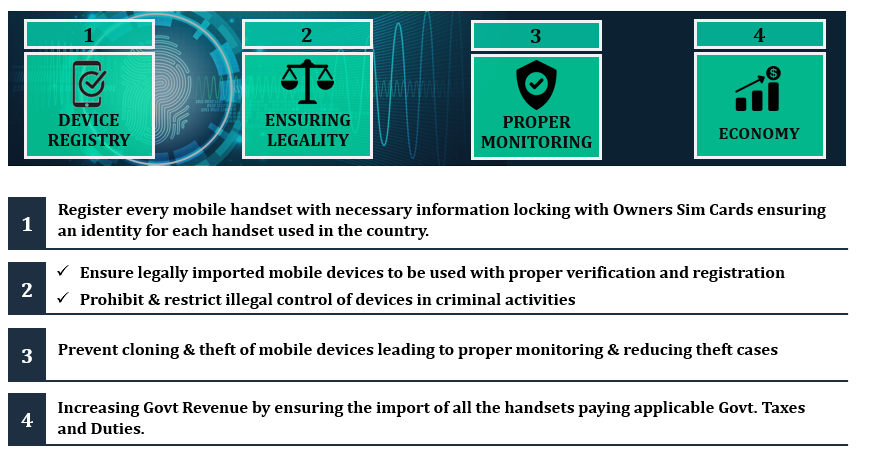
Major Activities of the Project:
- Establishment of Data Center
- Setting up hardware equipment at Data Center and Disaster Recovery Center
- Establish connectivity with the EIRs of all the Cellular Mobile Phone operators’ (CMPO)
- Establish connectivity with BTRC’s IMEI Database
- Deploy database & system software
- Testing of all features of NEIR along with all EIR of CMPOs, IMEI Database
- Bulk Data Migration
- Delta Data Migration
- GO LIVE(1st July 2021)
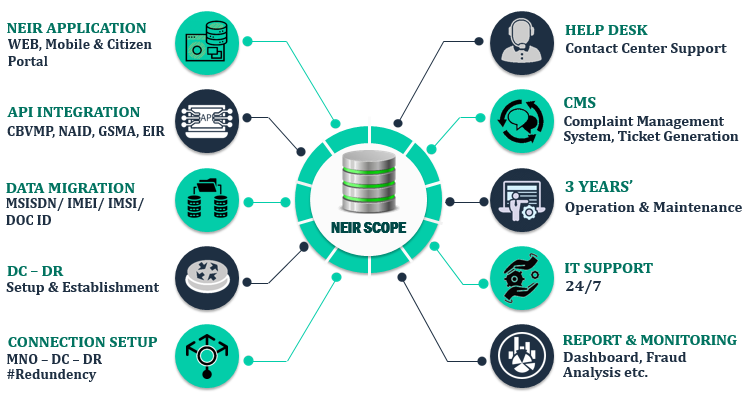
Figure: Major activities of the project
Impact of the Project
As cellular mobile phone service has a variety of impact in different domains of any society, the NEIR system also maintains its footprint in most of those sectors. The social, economic and environmental impact of this project has been mentioned below:
Social Impact:
After the deployment of NEIR system, Bangladesh has experienced significant positive impact on the social life of its citizens. After the implementation of this system, the use of illegally imported and counterfeited mobile handsets dropped drastically, which has resulted in a decreased crime rate in the country. In NEIR, every IMEI is registered to a specific NID, so this tool assists the law enforcement agencies to identify the suspected criminal while investigating any criminal activity. In addition, when a person, having filed a police report (General Diary) about his lost handset, submits a request at https://neir.btrc.gov.bd/ to block the IMEI of the lost device, BTRC, after investigation, can block that particular device. In this way, the stolen device will be of no use. There is also a mechanism to unblock the IMEI if the device is found and the owner places the request for it.
Economic Impact:
The implementation of NEIR system raised awareness of using illegally imported or counterfeited mobile handsets. Before buying any mobile handset, the customer can now verify whether the device has been imported/ manufactured through proper channels by dialing a specific ‘short code’ *16001#. If the desired IMEI is not found in BTRC’s database then the user usually gets discouraged to buy the device.
In addition, for mobile financial services (MFS), the SIM number is the integral part of identity for any citizen. In NEIR system, IMEI number of device is tagged with a NID number. This in turn is ensuring the use of secure digital device for MFS. After implementing this system it has become easy to tackle forgery in this sector which in turn encouraged more people to adopt MFS. As a result, growth rate of financial inclusion has increased, which has a positive impact in the development of the country.
After implementing this system, sale of illegally imported and counterfeited mobile handsets declined drastically. The business of legally imported and approved mobile handsets saw a significant rise. This ensured revenue earning for the Government.
Environmental Impact:
Quality of counterfeited mobile handsets is usually very low. To be precise the Specific Absorption Rate (SAR) value of these devices is very high and hazardous materials are used. Implementation of NEIR system made the counterfeited mobile handsets less attractive to the customers which is passively reducing the rate of environmental degradation.
While designing and developing this system the environmental impact of the datacenter has been taken in to consideration. The mechanical, electrical, electronics and computer systems has been designed for maximum energy efficiency and minimum environmental impact while disseminating the data.
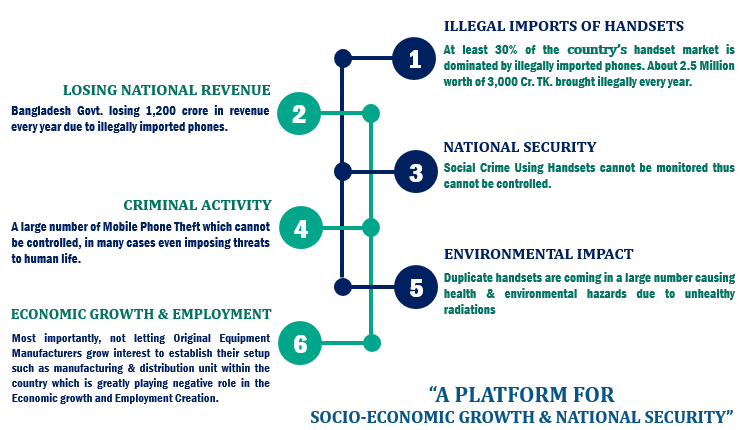
Figure: Impactful features and analysis
Linkages between the WSIS Action Line and the SDGs
Connection with the WSIS Action Line:
- Over the last decade, the mobile industry in Bangladesh has scaled rapidly. Till November, 2021 the country has around 126.60 Internet subscribers of which 116.53 are mobile Internet subscribers. Currently the mobile phone user density is around 98.48% and more than 99.67% of the country’s land area is under the coverage of cellular mobile network. Therefore, the role of cellular mobile service in the socio-economic development of Bangladesh is easily understandable. Subsequently, identification of each and every SIM card is essential to provide security of these subscribers in cyber space. Thus, NEIR aligns with the fifth action line of WSIS which is “Building confidence and security in the use of ICTs”.
- With the help of NEIR system, the Government, in cooperation with the cellular mobile operators of Bangladesh, is preventing, detecting and responding to cyber-crime and misuse of ICTs through mobile phones.
- After the implementation of this system people became aware of using illegal and counterfeited mobile devices.
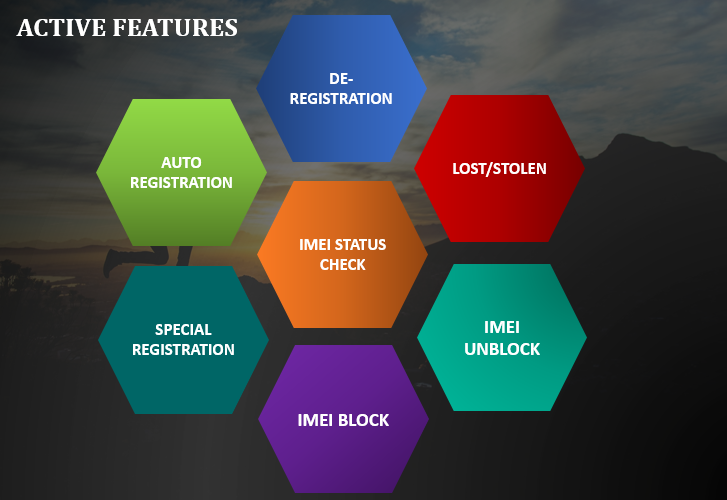
Figure: Features of NEIR
Connection with the SDGs:
Successful implementation of the NEIR facilitates the following targets of the respective SDGs:
- Goal 16: Peace, Justice and Strong Institutions
- Significantly reduce violence using cellular mobile phone
- Reduce abuse, exploitation, trafficking and all forms of violence against and torture of children using cellular mobile phone
- Promote the rule of law at the national level
- Reduce illicit financial and arms flows, strengthen the recovery and return of stolen assets and combat all forms of organized crime.
- Substantially reduce corruption and bribery in all their forms
- Ensure responsive, inclusive, participatory and representative decision-making at all levels
- Ensure public access to information and protect fundamental freedoms, in accordance with national legislation
- Goal 11: Sustainable Cities and Communities
- The project aims to meet the target “By 2030, significantly reduce the number of deaths and the number of people affected and substantially decrease the direct economic losses relative to global gross domestic product caused by disasters, including water-related disasters, with a focus on protecting the poor and people in vulnerable situations”. Using this system it would be possible to categorically assume the users’ financial background and deliver required services to the actual target group.
- Goal 3: Good Health and Well-being
- The project aims to meet the target “Achieve universal health coverage, including financial risk protection, access to quality essential health-care services and access to safe, effective, quality and affordable essential medicines and vaccines for all”. Using this system it would be possible to categorically assume the users’ financial background and deliver required services to the actual target group.
Highlights of the Project’s Stakeholders Activities:
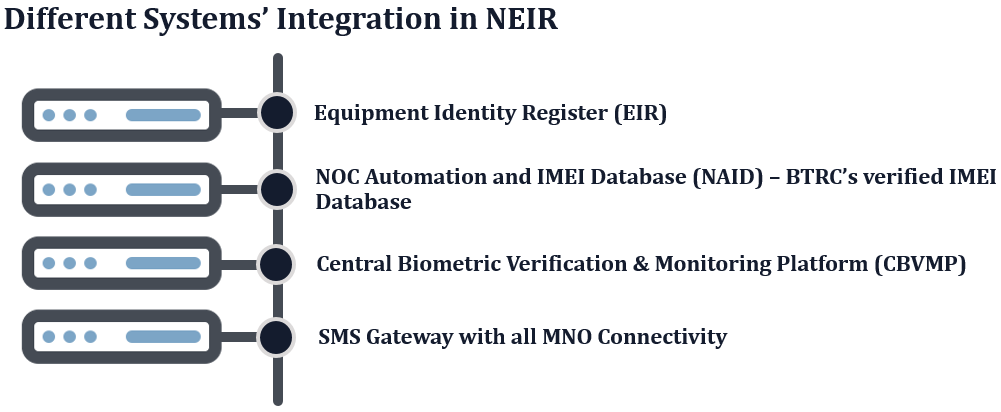
Figure: Role of various stakeholders
Challenges and Project’s Future Perspectives
Challenges:
- Establishing EIR at CMPOs’ End: Before establishing National EIR it is necessary to establish local EIR at operators’ end which incurs a huge cost and technical knowhow. Earlier CMPOs did not have EIR of their own. So when the Government decided to deploy National EIR the operators’ had to deploy their own EIR first. It required a lot of invest and planning at the operators’ end. Then the operators’ EIR were connected to National EIR. This integration was also challenging as different operators were having EIR from different vendors.
- Bringing all CMPOs in a common platform: Different CMPOs are using different technologies, database, and structure. NEIR is a centralized platform where every CMPO has to with connect common structure and protocol.
- Data migration: Data inconsistency like invalid data format, duplicate data from CMPOs made data migration a challenging task. The actual data volume from CMPOs were much higher approximately a few times than anticipated data volume. Due to huge volume of backlog data from CMPOs, a huge time was spent in cleaning, processing and migrating them to NEIR.
- Ensuring security of the dedicated links to the network operators: Constant monitoring of dedicated links to network operators is required to ensure security and connectivity of subscribers’ information database.
- Controlling existing market with huge percentage of illegal Handset: Illegally imported and counterfeited handsets are cheap and not hard to find. Earlier people were not much concern about the disadvantages of using such devices. The Government had to run massive public awareness program to make people aware of using authentic mobile devices before deploying the NEIR.
- Meeting the deadline: COVID Situation in Bangladesh made the entire team to put extraordinary effort to implement the system within the timeline.
Future Perspectives:
- Provide the basis for a cashless society (i.e. device authentication) through digital payments.
- Provide the basis for Internet of Things (IoT) through device authentication.
- Prevent use of false identification in social media and other online communication, to ensure secure communication
- Uniquely and more accurately identifying subscribers to provide public services through mobile network.
Replicability
NEIR can be replicable at the national level in any country. Specially in developing and under developed countries who are experiencing huge increase mobile devices, such systems can play a significant role to provide security to the citizens in addition to provide citizen services. Any country would be able design and develop such systems with its own information technology experts and servers available in the market.
Sustainability
The NEIR system can be considered as sustainable project considering the following aspects:
- The system is designed and developed completely by local information technology professionals who are available 24X7 to provide any technical support.
- The required hardware and proprietary software are widely available in the market. The hardware and software can be easily upgraded at any time.
- The system is scalable. Modules can be added, modified or eliminated at any time with very little cost.
- Since 1 July 2021 huge number of users accessed the system website to register their devices. Which indicates significant awareness has been created among the citizen to use legally imported or manufactured mobile handsets.
Views on WSIS Stocktaking and Prizes Contest
WSIS Stocktaking and Prize will be an inspiring achievement for the Government of Bangladesh. It will be a critical platform to spread the scope of our work to the other countries of the world. It is hoped that the impact of this initiative will be known and applied far from the geographical limits of Bangladesh.
About: BTRC
Bangladesh Telecommunication Regulatory Commission (BTRC) an independent Regulatory Commission established under the Bangladesh Telecommunication Act, 2001, (Act no18 of 2001) published by the parliament in the Bangladesh Gazette extraordinary in new on April 16, 2001. BTRC started his journey from 31st January 2002 to conduct the activities of the said act. According to the Telecommunication act, the Commission is assigned with various responsibilities. Out of those, establishing, operating, regulating, maintaining telecommunication establishments and providing various telecom services in the country are the major ones. Besides, fixing charges on the subscribers, ensuring the services for the subscribers and to ensure people’s right are also tasks of BTRC. The social and economic behavioral pattern of the telecom service providers are also monitored by the BTRC to ensure that the users are not subjected to harassment and not indifferent in nature.




